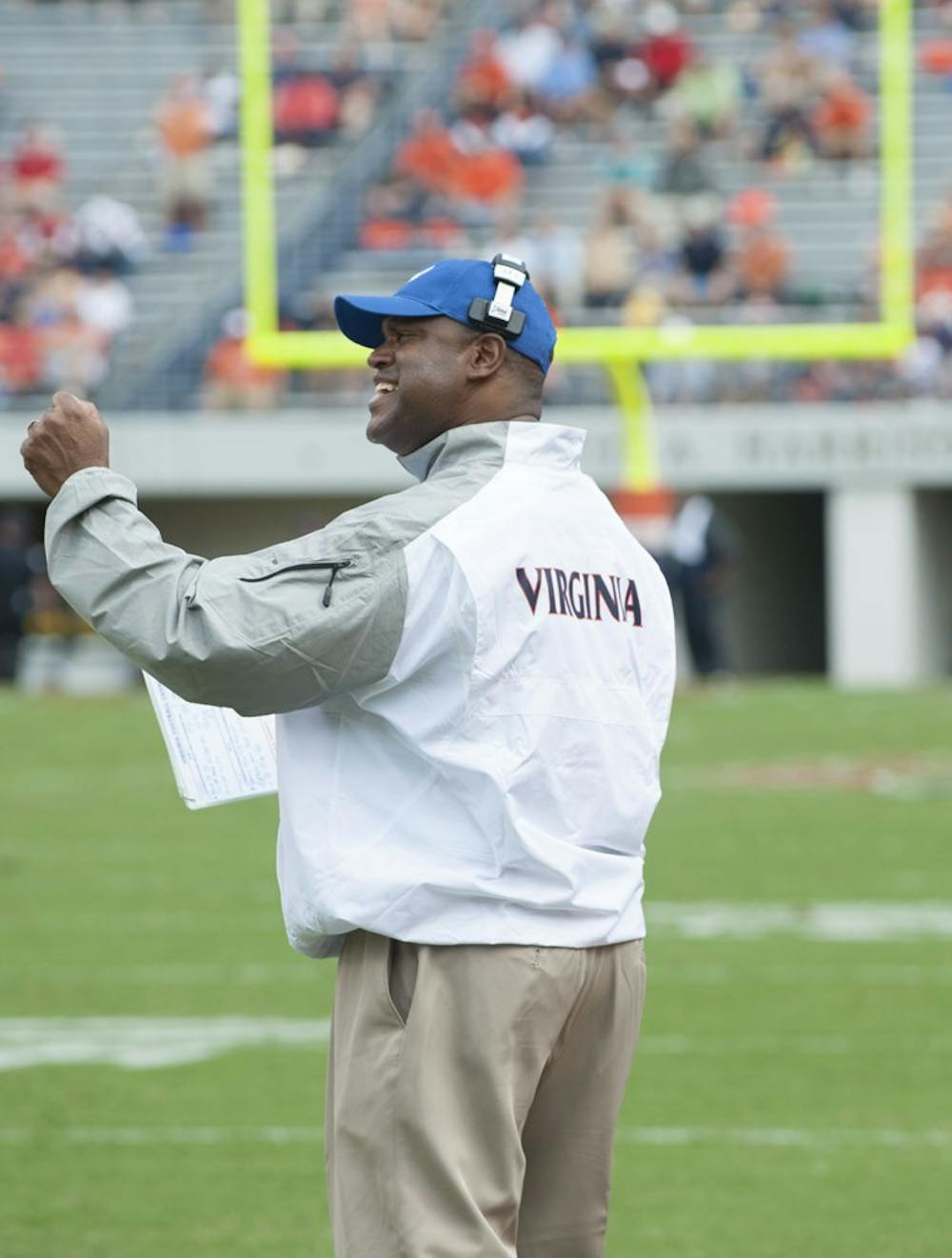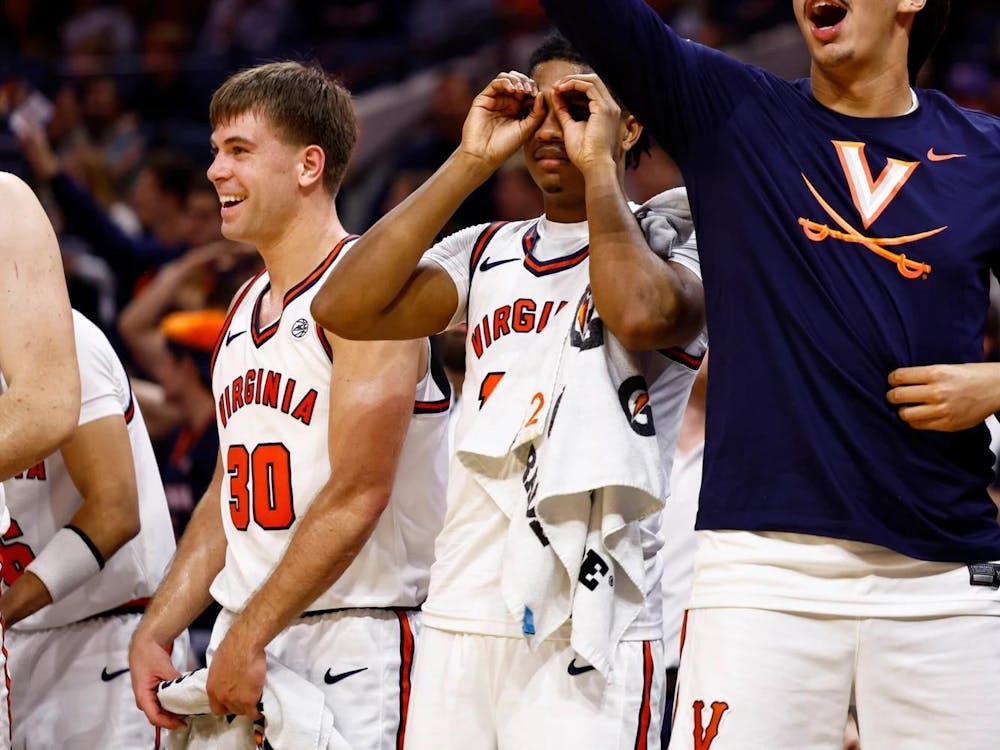As the celebration unfolded at Scott Stadium Saturday following the Virginia football team’s 23-21 victory against then-No. 21 Louisville, reactions were anything but understated. Henry Coley wept. Greyson Lambert beamed. Mike London exalted. And thousands of orange-clad fans, swept up in the delirium of the moment — not to mention the stampede of feet behind them — stormed the field to join the party.
The surreal scene was purposefully excessive. Consecutive losing seasons seemed to demand a truly galvanizing moment to formally announce the coming of a new era. But once the euphoria faded, the fans cleared, the locker rooms emptied and the self-congratulation tapered off, the true import of Virginia’s victory became clear to me: the win doesn’t really matter. Not yet.
What matters is what comes next.
While nothing can erase the elation the team and their fans enjoyed Saturday, the remainder of the 2014 season will dictate how it is remembered. The win could mark the beginning of a truly meaningful run that changes perceptions of Virginia football. Or it could simply be the illusory high point in another dismal year. Right now, either is possible.
Just ask the 2013 Virginia football team.
When the Cavaliers weathered a two-hour lightning delay to knock off highly-favored Brigham Young for an improbable 19-16 season-opening win last year, fans were justifiably optimistic. They envisioned brighter days and saw a team that apparently bore little resemblance to the underachieving 2012 Cavalier squad.
It was a program-altering victory. Until it wasn’t.
All that went awry for the remainder of 2013 — David Watford’s struggles, special teams woes, defensive inconsistencies, predictable play-calling, inadequate execution, et cetera — does not need to be rehashed here (my editor only gives me 1,000 words). But that tailspin serves as the most prescient reminder that transformative moments usually can’t be correctly identified until long after the fact. The Brigham Young upset is remembered today as an outlier, not a turning point.
The same could still be true this year. Virginia’s first three games have produced both promise and cause for concern. Virginia leads the ACC in takeaways with 13, and has been thoroughly dominant on defense. Henry Coley, Eli Harold and Anthony Harris have played as well as any three defenders I have seen in my four years at the University. They strike fear into opposing offenses and give Cavalier fans reason to believe that a game-altering play could occur at any moment.
But the offense has been abysmal, surrendering a conference-worst eight turnovers and struggling to produce at key moments. Describing the unit as a work in progress would be excessively flattering — progress has been almost non-existent. After gifting a victory to UCLA in the season-opener by allowing the Bruins to score three defensive touchdowns in the second quarter, the Cavaliers coughed up the ball three times against the Cardinals.
Virginia’s offense has scored only one more touchdown this season than it has allowed in its two games against FBS opponents. The quarterback shuffle is back; running backs have found little daylight; explosive plays have been few and far between; and the team ranks 10th of 14 ACC teams in total offense. Louisville muffed a punt to give the Cavalier offense the ball at the 25-yard line with a chance to make a potential game-tying field goal for kicker Ian Frye just a little easier, and the team failed to move forward a single yard.
That late Louisville miscue obscured just how poorly the offense had performed for much of Saturday. Coley described the Cardinals’ fateful error as “magical,” and for better and worse he is right. That rare play has haunted the Cavaliers so much in the past few seasons that London could only chuckle after the game and say, “It’s about time it happens to somebody else.” But “magical” scale-evening breaks like that cannot be counted on week in and week out to produce victories.
Teams need more substance than divine intervention to carry them through a 12-game season. And right now, the substance is still a bit underwhelming. The question this team must answer in the next few weeks is not: How can one great game unify a team and create momentum? The question they must answer is: What tangible improvements will London and offensive coordinator Steve Fairchild make to put points on the board?
Most importantly, the Cavaliers must look inward and ask: Why will this year be different?
After Virginia beat Brigham Young to start the 2013 season, London called the victory “a tremendous boost for this team” and told his players, “We can be happy now, but we can’t be satisfied.” That was Aug. 31, 2013, nearly 400 days before the Cavaliers’ win against Louisville. It was also the last time the team beat an FBS-level opponent before Saturday.
So after losing nine straight games to end last season; after suffering a combined 18 losses to just six wins in the past two seasons; after being projected by the media to bring up the rear in the Coastal division again this season — what is the proper way to react to an upset victory?
The Cavaliers are happy; that is clear. But are they satisfied? That remains to be seen.







